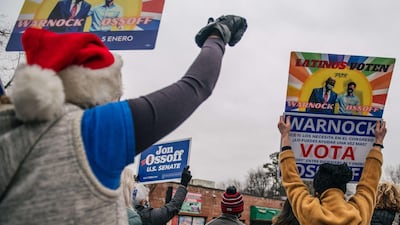In just over two weeks, Joseph R Biden is expected to be sworn in as the 46th President of the United States. But before the gallantry and speeches, Congress must meet in a joint session to officially count the votes of the Electoral College. It’s the final step in confirming Mr Biden’s win.
The Electoral College votes were confirmed by each individual state on December 14. President-elect Biden earned 306 votes while President Donald Trump got 232.
On Wednesday, January 6 at 1pm Congress will officially begin certifying those results. The special session is presided over by Vice President Mike Pence in his role as president of the Senate. The count is done alphabetically by state.
It’s an obscure and often forgotten part of the electoral process but this year’s session has taken on added importance after a group of congressional Republicans supporting outgoing President Trump said they will object to the certification process.
“Normally it goes off and nobody pays any attention and people forget about it and it’s a little blip in the evening news,” said Robert Alexander, a professor of political science at Ohio Northern University in Ada, Ohio. “That will not happen on the 6th.”
Ted Cruz, a Republican senator from Texas is spearheading a group of 10 other senators who have vowed to challenge the certification process. “Voter fraud has posed a persistent challenge in our elections, although its breadth and scope are disputed. By any measure, the allegations of fraud and irregularities in the 2020 election exceed any in our lifetimes,” the group of senators said on January 2.
For months, Mr Trump and his allies have been hurling allegations of voter fraud and irregularities at anybody who will listen. Every single one of the more-than 50 instances that they have brought to the courts has been shot down. January 6th is one of the last opportunities they have to challenge the results.
How the process works
The certification process is usually pretty straightforward and relatively quick. As required by the US Constitution, both chambers of Congress, the House of Representatives and the Senate will meet on January 6th in a session that begins at 1pm.
Vice President Mike Pence, the president of the Senate, opens up sealed certificates submitted by each state, starting with Alabama. He then hands them to tellers appointed by the House of Representatives and the Senate. The tellers then read the results out loud, the votes are recorded and a winner is declared.
What happens if there’s an objection?
After the votes are read out, members are allowed to object to the results. Objections must be submitted in writing and signed off by both a member of the house of representatives and a senator. It happened most recently in the last election as well as in 2005 and 2001. Once the objection has been submitted, both the Congress and the Senate retire to their chambers to debate the validity of the objection. The debate may last no longer than two hours.
Could the 2020 election results be overturned?
In order for the results to be overturned, both chambers must vote in favour of doing so. This makes it nearly impossible for any of the results to be overturned, despite the efforts led by Senator Cruz.
“It’s pretty clear that they can’t change anything because they need a majority in both the House of Representatives and the Senate and since the Democrats control the House of Representatives there’s no way that’s going to happen,” said Kermit Roosevelt, a professor of law at the University of Pennsylvania.
This is one of the last opportunities for Mr Trump and his allies to further cast doubt on the election results. And while they’re unlikely to succeed, it’s an opportunity to further degrade the clarity of the results while also shoring up their own political bases.
“I don’t think that Senators Ted Cruz or Josh Hawley believe that there is a basis for this. They’re better educated and smarter than that. I don’t think that they just want to destabilise our political system, they’re not anarchists, so I presume that the point of this is that they know it will make them more popular with Trump’s supporters and the problem is that they’re tying their political future to people who believe this narrative about the election being stolen and believe all sorts of crazy things,” said Mr Roosevelt.
The event is likely to bring lots of pomp and circumstance but little substance Mr Alexander says. “I expect there to be a lot of grandstanding. It’s all performative, which a lot of things in politics have become. It’s about placating your base, taking care of the people you think will support you into the future.”
What happens next?
If all planned objections from the House of Representatives receive support from a member of the Senate, the total debate time could exceed 12 hours, meaning what’s usually a quick session could run into the next day. Both Professors Alexander and Roosevelt expect the session to wrap up by January 7, finally ending the presidential election and paving the way for Mr Biden’s inauguration on January 20.

















